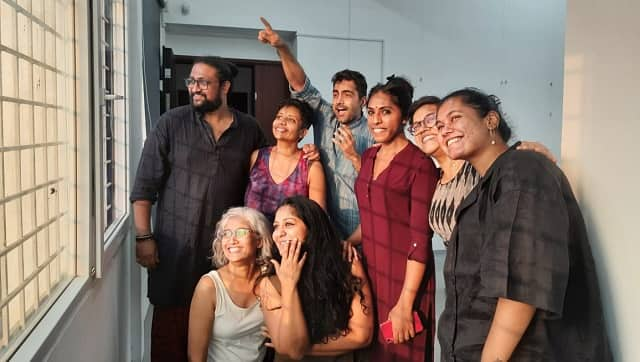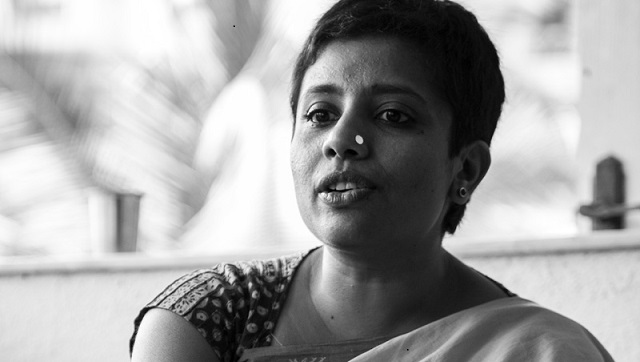Maitri Gopalakrishna is a Bengaluru-based drama therapist, counselling psychologist, theatre maker and practice-researcher. Earlier this year, she began working on the Conversations in Drama project as part of Mindscapes Bengaluru, a mental health programme run by the Museum of Art & Photography (MAP) in collaboration with the Wellcome Trust in London. She has been working with the Parivarthan Counselling, Training and Research Centre in Bengaluru since 2009. “This city has the most professional mental health practitioners. However, this is woefully inadequate for a population of 10 million. The fierce stigma against meeting a psychiatrist, psychologist or even a counsellor forms an additional barrier,” she says. She completed her PhD at the Tata Institute of Social Sciences in Mumbai and her MA in Counselling Psychology with a concentration in Drama Therapy from the California Institute of Integral Studies in San Francisco. With this training, she has been working towards addressing the need for more “accessible, non-threatening, anti-oppression and culturally rooted mental health interventions”. Read this interview with her to learn more about her work. You identify yourself as a “drama therapist, counselling psychologist, theatre maker and practice-researcher.” Could you help us unpack this with some examples? A drama therapist uses drama/theatre methods and processes with individuals or groups intentionally and systematically towards the goals of mental health and well-being. My drama therapy Masters programme at California Institute of Integral Studies (CIIS) was housed in the School of Professional Psychology, and I received training in counselling psychology. One part of my work is clinical; the context is similar to individual or group counselling or psychotherapy. Just like someone who is dealing with some emotional, psychological, relational, behavioural, or existential distress may seek talk therapy, they may choose to see a drama therapist or another creative arts therapist. Here the frame is psychotherapy but within the process we may use embodiment, games, theatre exercises, role plays, physical articulation of emotions, mask or puppet work and other interventions. Play is a central component of drama therapy. We believe that we can do serious work with lightness and even playfulness, without trivialising the seriousness of it. Working playfully allows our clients to be able to hold their experience with lightness. That itself can allow us a new perspective or some breathing space. Another useful strategy of drama therapy is the ability to be able to project a feeling or problem onto an object like a puppet. Then we work with and through the object or puppet. There is greater safety in speaking about the puppet who feels pain than to speak about one’s own pain. [caption id=“attachment_10588471” align=“alignnone” width=“640”] Maitri Gopalakrishna[/caption] I came to drama therapy through my work in theatre, and specifically community theatre. These days, the performances I make are largely what can be understood as therapeutic theatre. In the work I do, aesthetic and therapeutic goals are woven together in order to create a performance that has transformational potential for the performers and audiences alike. Practice research is about being able to ethically, reflexively and rigorously examine one’s own practice through a research frame of objectives, questions, and methodology. I believe that rigorously exploring my own practice in this way makes me a better and more responsible practitioner beside making it possible for me to share my work. How would you define mental health?
Mental health is not just the mere absence of illness but a state of wellbeing.
It includes feeling secure, safe, protected, and connected. It is about being able to not only function but also make meaning, have aspirations, create, etc. Could you tell us how you got involved with the Museum of Art & Photography (MAP) and Mindscapes Bengaluru, and developed the Conversations in Drama project? I was invited to be a part of a convening hosted by Quicksand on behalf of the Mindscapes Initiative of the Wellcome Trust. Here I found myself among several people from the cultural, arts and mental health spaces. MAP was also one of the participants. So, we met and spoke and then a possibility to collaborate on a project together developed. [caption id=“attachment_10588481” align=“alignnone” width=“640”]  In the picture, the facilitation team (L-R) Padma, Pallavi ; standing L-R Vamsi, Maitri, Arjun, Shilok, Aruna, Yutika. Missing Madhu and Vijji.[/caption] You plan to run “community-based drama interventions to foster and understand mental health support in diverse underserved social groups in the city.” Could tell us who they are, and how you or MAP zeroed in on them for this project? Once MAP and I had decided to collaborate on this, we decided to see if we could somehow use this opportunity to amplify “unheard voices” in the mental health discourse in Bengaluru. I did not want to be an individual practitioner working with a nice grant, rather see if we could begin to bring together practitioners from different backgrounds to see what interventions would grow if we simply created a fertile ground. I began by reaching out to five experienced drama and mental health facilitators that I had worked with before. We all have a certain socio-political orientation to our work and compatible approaches to practice.
I asked them: If you had a bit of money and could do a piece of work that you have been called to do for a while, what would it be? What is your personal investment in it? How are you implicated in the work? Each facilitator had a project in mind almost instantly. In each case, the group that they wanted to work with were ones they identified with and the questions/problems they wanted to explore were ones they too grappled with. This very personal connection was ethically important. That is how we began. Then each facilitator identified and reached out to potential co-facilitators with different social locations, identities, life experiences and skill sets, and to community groups, organisations, etc. It was important that the work did not begin and end with these six months. There is a motivation and desire to continue it, along with partners. Each facilitator team identified the groups or communities based on one that they belonged to or had a connection with in some way and a problem that they wanted to explore for them. This was the starting point. As connections were built, participants, communities and groups become collaborators. Their needs entered the mix and plans had to be altered accordingly. Could you tell us about these facilitators and the work they are doing? The Conversations in Drama project revolves around five community-based group drama interventions with underserved groups including neuro divergent children, college students from marginalised caste backgrounds, LGBT folk, caregivers of loved ones challenged with mental health conditions or mental illness, and caregivers in the context of geriatric care. The aim is to create a space for dialogue in action around issues the groups are dealing with, building networks and resources, helping participants connect with their own agency. Banni, seri (‘Come, gather’ in Kannada) is an arts-based project in public spaces through storytelling, visual arts, puppets, songs, movement and theatre games for neuro divergent children. This will be conducted as a group process for the children and their caregivers in Cubbon Park. It will be facilitated by Aruna Manjunath – a visual artist, theatre practitioner and arts educator – and assisted by Yuthika Subramanyan, an arts educator and psychologist. The Blue Line project hopes to build connections and sustainable support systems within the Dalit student community in the age group of 18-24 across educational institutions within Bengaluru. It will use drama and video diaries to explore their lived experiences and respond to their emergent needs. The project will be facilitated by Padmalatha Ravi, who is a mutli-disciplinary artist and therapist, and Sri Vamsi Matta who is a theatre artist. His practice is influenced by his Dalit identity, experience and location.
‘Let’s talk about sex baby’ is a project bringing conversations about sex, wellness and sexual health in open spaces in a safe, creative and life-affirming way. Each week people from the queer community will gather to engage in some drama, movement and other activities, which will prepare them to enter into the selected stories as characters and play out the narrative in the roles they take up. The creative process will be followed by conversations around the enactment. It will be facilitated in English and Kannada by Arjun Khera, who is a drama and movement therapist, and Shilok Mukkati who is an activist for diversity and inclusion using dance and poetry. She is trying to create a language to speak about queerness in Kannada. Another project is Manasu Maathu (literally ‘mind conversations’ in Kannada), which will be an explorative support group for caregivers of loved ones with mental health challenges and mental illness. There will also be a few open group sessions where families can come together to gently learn and unlearn ways of approaching conversations on mental health wellbeing. The facilitator is Pallavi Chander, a drama and movement therapist, and Mohini Singh who is an expressive arts therapy practitioner and a psychologist. The Magic Shop project is a psychodrama and storytelling-based process for caregivers of older adults. It will explore how listening and sharing of stories can replenish internal resources, deepen resilience, and become a safe space for regulating unexpressed emotions. The people holding it together are Madhu Smriti Shukla who is a theatre facilitator and psychodrama practitioner, and Vijayalakshmi Chari is a coach, facilitator, and storyteller. What kind of philosophical and political frameworks are you drawing on? All the facilitators bring in their own methodological and philosophical frameworks and styles but there is an overarching socio-political lens to mental health. Everyone recognizes that oppression, injustice, poverty, and systemic inequity impact mental health. The motivation of collective liberation and solidarity is chosen over charity, pity, guilt or a desire to save. Many of us are influenced by the analytical framework of intersectionality and the work of Paulo Freire and Augusto Boal. We use these as theoretical frameworks as well. How do you plan to document all these amazing projects? Answer: We have an arts-based research strand that extends across all five interventions. The aim of the research component is to qualitatively explore how people who don’t access psychological or medical mental health language make sense of, express and share experiences related to mental health, distress and care. Data will be collected in the form of recorded participant conversations, photographs, process notes and facilitator observations. It will be analysed thematically and results of the study will be presented in the form of a written report, or an exhibit, a film, maybe some combination of these. We hope to make it available for arts and mental health practitioners to access, engage with, and learn from.
I am in charge of overseeing all projects and to make sure that facilitation teams receive support and supervision. The research component will be taken care of by Debosmita Dam and me. She is an interdisciplinary artist, researcher and arts manager. She is interested in the pedagogical possibility of applied arts, and in expanding a visual imagination and vocabulary of the connection between the mind and body. To support us we also have Dr. Sanjeev Jain and his team from the National Institute of Health and Neurosciences (NIMHANS).
Chintan Girish Modi is a writer, journalist, commentator, and book reviewer Read all the Latest News , Trending News , Cricket News , Bollywood News , India News and Entertainment News here. Follow us on Facebook, Twitter and Instagram.


)
)
)
)
)
)
)
)
)



